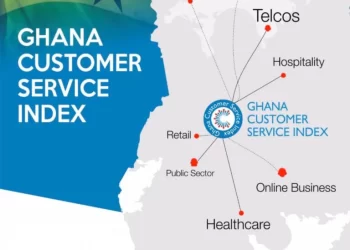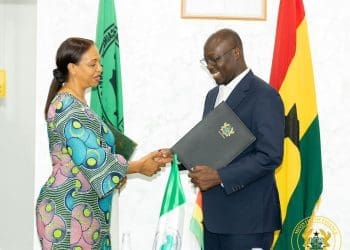The Bank of Ghana (BoG) has directed Stanbic Bank to close all accounts linked to the National Seed Trade Association of Ghana (NaSTAG) following allegations of identity theft, procedural lapses and unauthorised account opening.
The directive by the BoG affects three accounts and follows a regulatory review of a complaint brought before it about fraudulent activity at the Stanbic Bank Achimota Branch.
Dr. Amos Rutherford Azinu, immediate past president of NaSTAG, in a petition dated 18 October 2024, requested the BoG to investigate “fraudulent activity at Stanbic Bank Achimota branch.”
Responding in a letter dated August 7, 2025, and signed by Ms. Sandra Thompson, Secretary, the Central Bank, confirmed that “following the Bank’s investigation, a supervisory action has been taken.”
And that, “Stanbic Bank has been directed to take immediate action to close the additional account opened for the operation of the AGRA account.”
The directive followed months of complaints and forensic investigations initiated by Dr. Amos Rutherford Azinu, immediate past president of NaSTAG.
Dr. Azinu, who has consistently denied authorising the opening of the account of the association, described the incident as “a case of identity theft and procedural compromise.”
In a formal petition to the Inspector General of Police and the Bank of Ghana, he alleged that his Ghana Card, passport photograph, and forged signature were used to open an account at Stanbic’s Achimota Branch without his consent.
“I have never visited Stanbic Bank, Achimota Branch, nor authorised any individual to open an account on my behalf using my personal documents,” Dr. Azinu stated in a letter dated August 15, 2025.
He demanded the arrest of Mr. Leonard Nii Lante Mills, a former NaSTAG accountant, and several Stanbic staff members, including Jude Gbeddie, Lorraine Nyampong, and John Jaisey.
Stanbic’s internal forensic report, dated December 5, 2024, confirmed that the disputed account, Cedi account number 9040011948000, was opened on February 27, 2024, using a resolution dated October 5, 2023.
The resolution listed Dr. Azinu as a signatory alongside Ms. Elorm Goh and Mr. Andrew Nii Adjetey.
However, Dr. Azinu, in a petition a petition dated October 18, 2024, maintained that he never signed any Stanbic documents, stressing, “I categorically reject this, as I have never completed any account opening or signatory forms.”
The forensic report revealed that Mr. Mills submitted the resolution and accompanying documents, including photocopies of Azinu’s Ghana Card.
Mr. Gbeddie, a Universal Banker at the Achimota branch, stamped the signature card with “original sighted” despite never meeting Dr Azinu or verifying the ID in person.
“Mr. Gbeddie could not provide any explanation for this,” the report noted.
Stanbic’s initial correspondence, dated August 19, 2024, claimed Dr. Azinu was a signatory to all NaSTAG accounts, but a corrected letter the following day stated he was only a signatory to the new Ghana Cedi account.
Yet, the disputed signature card listed him on both Cedi and Dollar accounts, Dr. Azinu stated, emphasising that “This discrepancy clearly indicates fraudulent activity.”
In a follow-up interview by the Ghana News Agency, Mr. Mawuko Afadzinu, Head of Marketing at Stanbic Bank, acknowledged the controversy but emphasised that the bank acted on instructions from the seed trade association.
“This is internal association politics that has spilt over,” he said.
He added: “The details were from the association, including his Ghana Card. The bank has no interest in opening an account for someone without authorisation.”
However, a resolution dated January 24, 2024, instructed the bank to remove Ms. Augusta Nyamadi-Clottey, the former CEO, from all NaSTAG accounts.
Yet, the disputed account was opened a month later using an older resolution that still listed her as a signatory.
Stanbic’s forensic report dated December 5, 2024, indicated that while procedural lapses occurred, there was no evidence of collusion between bank staff and NaSTAG’s former employees.
“Investigations concluded that although it may have been ideal for the bank to ask for a new resolution instead of accepting the resolution dated 5 October 2023, the resolution was still valid.”
It added, “it would have been most appropriate to have met the new signatories and sighted their original identification cards before proceeding to verify their identity cards.
“The staff should have witnessed the signing of the signatures in line with positive identification requirements.”
Still, Dr. Azinu insisted the bank failed to provide the original signature card and Know Your Customer (KYC) documentation, despite repeated requests.
“The bank promised to produce the original signature card and KYC form… but failed to do so despite several reminders,” he told journalists in a press briefing at Otareso in the Eastern Region.
In a letter dated September 18, 2024, Dr. Azinu demanded disciplinary action against the bank staff involved, warning that failure to act would trigger a public awareness campaign and formal complaints to regulators.
“The integrity of our financial system and the trust of organisations like ours are at stake,” he cautioned.
Stanbic Bank formally notified NaSTAG on August 15, 2025, of its decision to terminate the banking relationship and close all accounts by August 31.
“After careful consideration, Stanbic Bank is no longer able to continue its relationship with you,” the bank stated.
The forensic report noted that “it is highly probable that Dr. Azinu inadvertently signed the signature card for Stanbic under a mistaken belief that he was signing for GCB.”
In documents submitted to bank officials and made available to the GNA, Mr. Mills claimed that Dr. Azinu had signed the card in his presence.
However, Dr. Azinu later disputed this, responding “I am not available” to a WhatsApp request to countersign a cheque.
The Bank of Ghana’s initial response, dated November 5, 2024, acknowledged receipt of Azinu’s complaint and pledged to investigate.
“We remain grateful for the confidence reposed in the regulator to intervene in resolving your complaint,” wrote Rev. Kwasi A. Twum, Head of Financial Stability Department.
As regulatory scrutiny intensifies, stakeholders are calling for systemic reforms.
Whether this marks the end of the saga or the beginning of broader institutional accountability remains to be seen.














